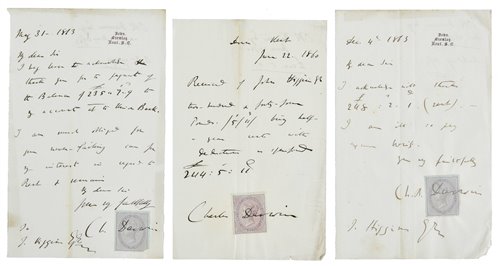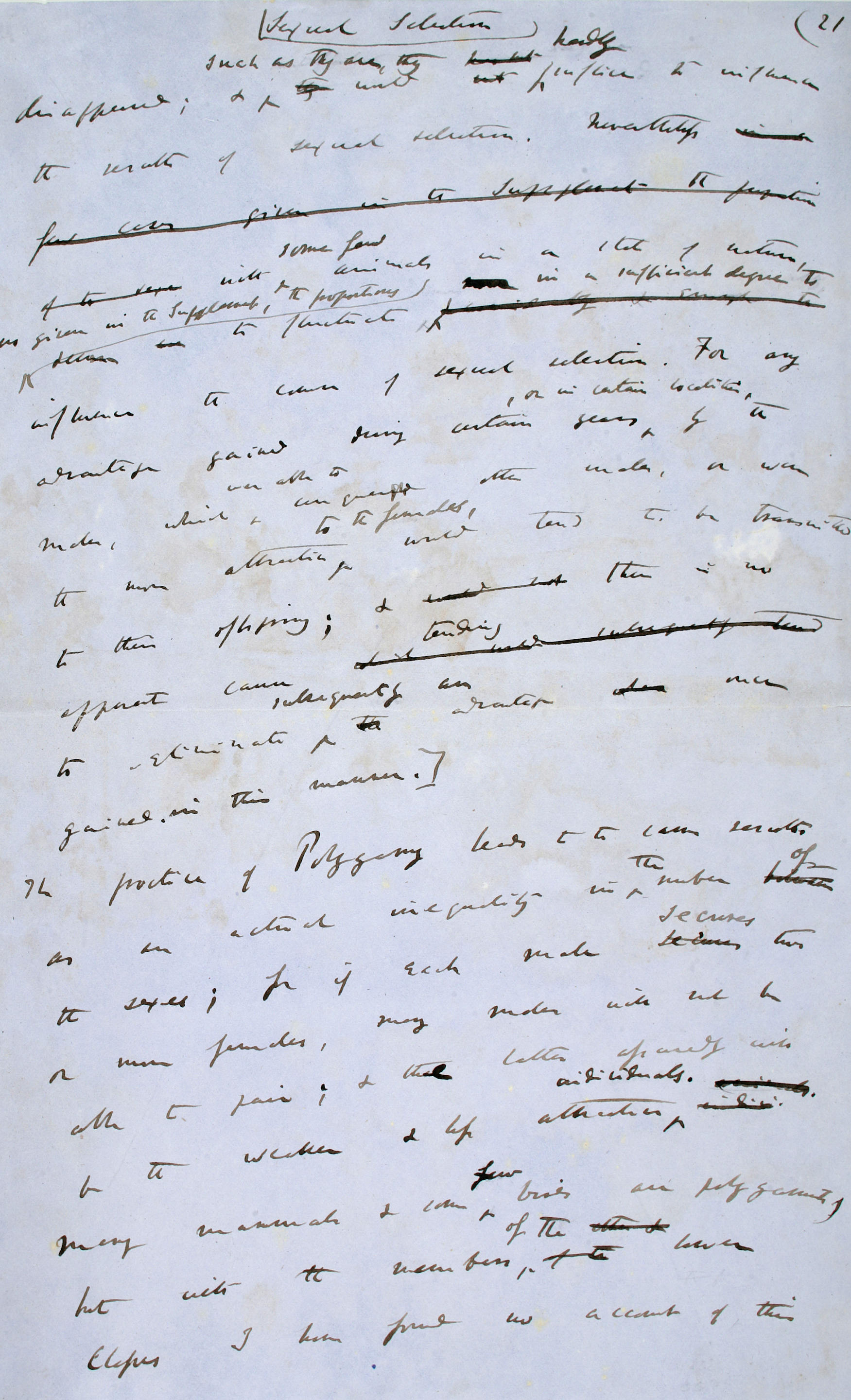DARWIN, Charles (1809-1882). Autograph manuscript, a leaf from a draft of On the Origin of Species by Means of Natural Selection , headed "Sect. VI Summary" and numbered "229" in Darwin's hand at top of page, comprising approximately 285 words (including deletions), in 26 irregular lines on recto plus a two-line insertion penned on the verso., WITH NUMEROUS DELETIONS AND EMENDATIONS BY DARWIN, one encompassing 4 lines, the deleted text quite readable, a pencilled note at top of page "O of Sp Ch VI," n.p. [probably Downe, Kent], n.d. [July-December 1859]. 1 page, folio, 332 x 210 mm. (13 x 8 in.), in ink on a sheet of good quality blue paper, right-hand margin with deckle edges preserved, minute light spots to extreme right-hand edge in a few places , otherwise in excellent condition. "NATURAE NON FACIT SALTUM": A LEAF FROM THE MANUSCRIPT OF DARWIN'S 'ORIGIN OF SPECIES' An important leaf containing drafts of text which appear on pages 205 and 206 in the first edition of Origin (1859). In Chapter VI, entitled "Difficulties of Theory," Darwin attempted to anticipate and deflect some of the many objections which might be raised to the theory of natural selection and to indicate fruitful directions for further inquiry. The present text appears in the "Summary of Chapter" which neatly encapsulates his conclusions. Here, an important statement of the motto "Natura non facit saltum" (nature does not take leaps) in relation to natural selection is lined through, but Darwin subsequently incorporated the identical phrase at a later paragraph in the chapter. The motto, a theme of the chapter, he elsewhere explains rhetorically "Why should nature not take a leap? On the theory of natural selection we can clearly understand why she should not; for natural selection can progress only, by the shortest and slowest steps, and can never take a leap." With preceding and following text added in square brackets, the present leaf reads as follows: "[The same organ] having performed simultaneously very different functions, and then having been specialized for one function; or two very different organs having performed at the same time the same function and one having been retained must often have largely facilitated transitions. [Sentence lined out, but used in later paragraph of published text:] On the principle of natural selection we can clearly understand that ancient canon in natural history of 'natura non facit saltum.' We are far too ignorant, in almost every case, to be enabled to assert that any part or organ is so unimportant for the welfare of a species, that modifications in its structure could not have been slowly accumulated by means of natural selection. But we may confidently believe that many modifications, wholly due to the laws of growth, and at first in no way advantageous to a species, have been subsequently taken advantage; the habits or the other parts of the structure having been modified so as to accord with that which was at first independently acquired. We may belive that a part formerly of high importance [insertion, added on verso:] (as the tail of an aquatic animal now rendered terrestrial) has often been retained, when become of such high importance to a species, that it could not have been formed by natural selection, which acts solely for the welfare of the present possessor. Natural selection will produce nothing in one exclusively for the good or injury of another species; though it well may produce parts organs and excretions [highly useful or even indispensible, or highly injurious to another species, but in all cases at the same time useful to the owner]." The evolution of the text of Darwin's Origin , which has been termed the most influential scientific work of the entire nineteenth century, is complex and has been the subject of controversy, but it is evident that many years elapsed between his first tentative jottings in 1839, following his return from the Beagle voyage, and his final text as published in
DARWIN, Charles (1809-1882). Autograph manuscript, a leaf from a draft of On the Origin of Species by Means of Natural Selection , headed "Sect. VI Summary" and numbered "229" in Darwin's hand at top of page, comprising approximately 285 words (including deletions), in 26 irregular lines on recto plus a two-line insertion penned on the verso., WITH NUMEROUS DELETIONS AND EMENDATIONS BY DARWIN, one encompassing 4 lines, the deleted text quite readable, a pencilled note at top of page "O of Sp Ch VI," n.p. [probably Downe, Kent], n.d. [July-December 1859]. 1 page, folio, 332 x 210 mm. (13 x 8 in.), in ink on a sheet of good quality blue paper, right-hand margin with deckle edges preserved, minute light spots to extreme right-hand edge in a few places , otherwise in excellent condition. "NATURAE NON FACIT SALTUM": A LEAF FROM THE MANUSCRIPT OF DARWIN'S 'ORIGIN OF SPECIES' An important leaf containing drafts of text which appear on pages 205 and 206 in the first edition of Origin (1859). In Chapter VI, entitled "Difficulties of Theory," Darwin attempted to anticipate and deflect some of the many objections which might be raised to the theory of natural selection and to indicate fruitful directions for further inquiry. The present text appears in the "Summary of Chapter" which neatly encapsulates his conclusions. Here, an important statement of the motto "Natura non facit saltum" (nature does not take leaps) in relation to natural selection is lined through, but Darwin subsequently incorporated the identical phrase at a later paragraph in the chapter. The motto, a theme of the chapter, he elsewhere explains rhetorically "Why should nature not take a leap? On the theory of natural selection we can clearly understand why she should not; for natural selection can progress only, by the shortest and slowest steps, and can never take a leap." With preceding and following text added in square brackets, the present leaf reads as follows: "[The same organ] having performed simultaneously very different functions, and then having been specialized for one function; or two very different organs having performed at the same time the same function and one having been retained must often have largely facilitated transitions. [Sentence lined out, but used in later paragraph of published text:] On the principle of natural selection we can clearly understand that ancient canon in natural history of 'natura non facit saltum.' We are far too ignorant, in almost every case, to be enabled to assert that any part or organ is so unimportant for the welfare of a species, that modifications in its structure could not have been slowly accumulated by means of natural selection. But we may confidently believe that many modifications, wholly due to the laws of growth, and at first in no way advantageous to a species, have been subsequently taken advantage; the habits or the other parts of the structure having been modified so as to accord with that which was at first independently acquired. We may belive that a part formerly of high importance [insertion, added on verso:] (as the tail of an aquatic animal now rendered terrestrial) has often been retained, when become of such high importance to a species, that it could not have been formed by natural selection, which acts solely for the welfare of the present possessor. Natural selection will produce nothing in one exclusively for the good or injury of another species; though it well may produce parts organs and excretions [highly useful or even indispensible, or highly injurious to another species, but in all cases at the same time useful to the owner]." The evolution of the text of Darwin's Origin , which has been termed the most influential scientific work of the entire nineteenth century, is complex and has been the subject of controversy, but it is evident that many years elapsed between his first tentative jottings in 1839, following his return from the Beagle voyage, and his final text as published in

.jpg)
.jpg)

.jpg)


.jpg)
.jpg)



Try LotSearch and its premium features for 7 days - without any costs!
Be notified automatically about new items in upcoming auctions.
Create an alert